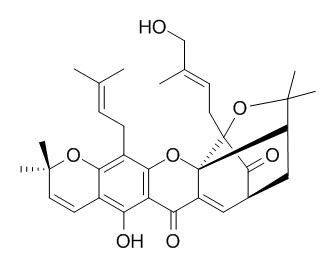Isomorellinol
Isomorellinol induces apoptosis in cholangiocarcinoma (CCA)cells which is mediated through a mitochondria-dependent signaling pathway.
Inquire / Order:
manager@chemfaces.com
Technical Inquiries:
service@chemfaces.com
Tel:
+86-27-84237783
Fax:
+86-27-84254680
Address:
1 Building, No. 83, CheCheng Rd., Wuhan Economic and Technological Development Zone, Wuhan, Hubei 430056, PRC
Providing storage is as stated on the product vial and the vial is kept tightly sealed, the product can be stored for up to
24 months(2-8C).
Wherever possible, you should prepare and use solutions on the same day. However, if you need to make up stock solutions in advance, we recommend that you store the solution as aliquots in tightly sealed vials at -20C. Generally, these will be useable for up to two weeks. Before use, and prior to opening the vial we recommend that you allow your product to equilibrate to room temperature for at least 1 hour.
Need more advice on solubility, usage and handling? Please email to: service@chemfaces.com
The packaging of the product may have turned upside down during transportation, resulting in the natural compounds adhering to the neck or cap of the vial. take the vial out of its packaging and gently shake to let the compounds fall to the bottom of the vial. for liquid products, centrifuge at 200-500 RPM to gather the liquid at the bottom of the vial. try to avoid loss or contamination during handling.
J Ethnopharmacol.2019, 241:112025
Front Microbiol.2023, 14:921653.
Preprints2017, 2017120176
Appl. Sci.2022, 12(4), 2032.
Nat Prod Sci.2014, 20(3):182-190
Chemical Engineering Journal2024, 500:157110
Front Immunol.2018, 9:2091
SBRAS2016, 12
Phytother Res.2018, 32(5):923-932
Int. J. Mol. Sci.2023, 24(20),15294.
Related and Featured Products
World J Gastroenterol. 2010 May 14;16(18):2235-43.
Apoptotic activity of caged xanthones from Garcinia hanburyi in cholangiocarcinoma cell lines.[Pubmed:
20458760 ]
To investigate the growth inhibitory mechanism of four caged xanthones from Garcinia hanburyi in cholangiocarcinoma (CCA) KKU-100 and KKU-M156 cells.
METHODS AND RESULTS:
Four caged xanthones, selected on the basis of their anticancer potency and chemical structure diversities (i.e. isomorellin, Isomorellinol, forbesione and gambogic acid) were used in this study. Growth inhibition of these caged xanthones was determined using the sulforhodamine B assay. Induction of apoptosis was assessed by observing cell morphology, ethidium bromide and acridine orange staining and DNA fragmentation assay. Levels of apoptotic-related gene and protein expressions were determined by a real-time reverse transcriptase polymerase chain reaction and Western blotting analysis, respectively.
CONCLUSIONS:
Our findings for the first time demonstrate that four caged xanthones induce apoptosis in CCA cells which is mediated through a mitochondria-dependent signaling pathway.
Anal Chim Acta. 2008 Nov 23;629(1-2):104-18.
Analysis of caged xanthones from the resin of Garcinia hanburyi using ultra-performance liquid chromatography/electrospray ionization quadrupole time-of-flight tandem mass spectrometry.[Pubmed:
18940327 ]
On-line ultra high-performance liquid chromatography (UHPLC) coupled with electrospray quadrupole time-of-flight tandem mass spectrometry (ESI-QTOF-MS/MS/MS) has been developed for the analysis of a series of caged xanthones in the resin of Garcinia hanburyi.
METHODS AND RESULTS:
The fragmentation of protonated molecular ions for 12 known cadged xanthones was carried out using low-energy collision-induced electrospray ionization tandem mass spectrometry. It was found that Retro-Diels-Alder rearrangement occurred in the CID processes and produced the characteristic fragment ions, which are especially valuable for the identification of this class of xanthones. The fragmentation differential between some cis-, trans-isomers was uncovered. Computation methods were utilized to rationalize the observed MS behaviors.
CONCLUSIONS:
On-line UHPLC-ESI-MS/MS/MS method has proved to be rapid and efficient in that within 6min, 15 caged scaffold xanthones, including three pairs of epimers and four pairs of isomers in gamboges, were effectively separated and identified. Among them, two known, namely isogambogenin (13) and Isomorellinol (14) and one likely new caged Garcinia xanthones from the Garcinia hanburyi were tentatively characterized based on the tandem mass spectra of known ones.



